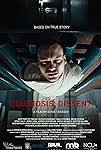Eye For Film >> Movies >> Diagnosis: Dissent (2023) Film Review
Diagnosis: Dissent
Reviewed by: Dalesia Cozorici

Ukrainian director Denys Tarasov's debut attempts to shed light on a crucial but under-discussed period in his country’s history, using archetypal characters and a playful aesthetic that nevertheless become entangled with the director's morbid obsessions. Diagnosis: Dissent certainly packs a punch when it comes to emotions, perhaps because it distills the rigorous style with which similar stories have been depicted on screen. Aiming to provide, rather, a cinematic experience while still orbiting the conventions of the war drama genre.
Rebel without a cause Andriy Dovzhenko (Kostyantyn Temlyak) emerges as a compelling character, who derives genuine happiness from life's seemingly insignificant delights. His affinity for American music and penchant for Western-style attire serve as markers of his individuality and zest for life. However, as his unconventional preferences become more pronounced they inevitably draw the attention of the authorities, promptly affixing him with the stigma of being an anti-Soviet sympathiser and setting the stage for a dramatic and tense collision.

It serves to underscore the pervasive atmosphere of suspicion and fear that characterized the Sixties and Seventies, when multiple complaints were raised against Soviet abuses targeted at individuals suspected of spreading dissenting ideas against the prevailing policies of that time. Such a sensitive situation also involves the fact that many individuals were diagnosed with schizophrenia and were confined to centres where mandatory treatments and rehabilitation therapy were imposed upon them, but in reality these clinics turned into depersonalisation and experimentation camps.
There's an ambition to deflate the subject's weight by supplementing it with stylistic imagery, filling it with rock music, and employing deliberate hypnotic camera movements. In some parts – such as when Andriy receives treatment that affects his physical condition – a completely new perspective emerges as he reflects on his family, while the camera rotates 360 degrees to simulate his body's movements. This process is followed by flashbacks and time jumps that open gateways to the situations of other characters who support Andriy's trajectory in the story. And even though the action unfolds almost entirely beneath the sound of a ticking clock, there are moments of silence that afford the sanatorium and its patients to be discovered – organically instilling an aspect of terror, a sense of dread. Undoubtedly, the victims of such scenes played a significant role in helping the film crew adhere as closely as possible to the coordinates of the events and details.
This commitment to authenticity intertwines seamlessly with the transition from a passive character to one who finds their principles along the way. While this evolution in storytelling often risks coming across as a generic formula - following a controlled trajectory from beginning to end - the lively performances and their placement within a refined atmospheric tapestry, well-supported by music and stage choreography, makes for a reliable vehicle through memory.
Diagnosis: Dissent is a well-rounded effort that investigates the status quo of countries manipulated by the Soviets, which, although not in a forced manner, draws some connections to the current landscape, worthy of a more reflective perspective.
Reviewed on: 10 Oct 2023

















